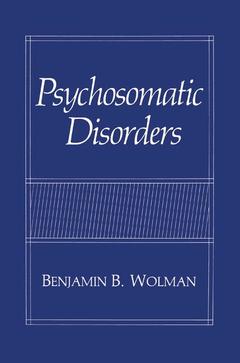Description
Psychosomatic Disorders, Softcover reprint of the original 1st ed. 1988
Author: Wolman Benjamin B.
Language: English
Subjects for Psychosomatic Disorders:
Keywords
diseases; emotion; health; heart; medicine; pharmacology; psychiatry; psychology; psychosomatic medicine; thinking
Publication date: 03-2012
326 p. · 15.2x22.9 cm · Paperback
326 p. · 15.2x22.9 cm · Paperback
Description
/li>Contents
/li>
This volume is an encyclopedic book on psychosomatic disorders, written for neurologists, psychiatrists, psychologists, psychiatric social workers, and other mental and physical health professionals. It could be used as a textbook in advanced training programs for the above-mentioned profes sions. It covers the entire field of mind-body issues in psychology and psychiatry and related areas of clinical medicine. The mind-body relationship is a two-way street. Anxiety, fear, anger, and other emotional states can produce physiological changes such as tears, elevated heart rate, and diarrhea. When these changes affect one's health, they belong to the province of psychosomatic medicine. On the other hand, the intake of alcohol and other substances can affect such psycholog ical processes as thinking and mood. When the intake of substances is helpful, they belong to the province of psychopharmacology. The substances that are hurtful and adversely affect one's mental health belong to the category of addictions and drug abuse. All these issues are somatopsychic. The present volume does not deal with somatopsychic phenomena no matter what effect they may have. It deals with the physical effects of psychological issues, and only with those that cause harm to the human body. Thus, it describes and analyzes psychosomatic disorders. It is divided into four major parts: theoretical viewpoints, etiological considerations, the psychosomatic diseases, and treatment methods.
I. Foundations.- 1. Conceptual Framework.- Defining Psychosomatics.- Homeostatic Approach.- Conscious and Unconscious.- Psychology and Physiology.- References.- 2. Historical Overview.- Ancient Ideas.- Modern Times.- Psychophysical Parallelism.- The Beginnings of Psychosomatic Medicine.- References.- 3. Psychoanalysis.- Sigmund Freud.- Alexander’s Theory.- Other Psychoanalytic Approaches.- References.- 4. Neurophysiological Approach.- Cannon and Selye.- Alexander.- Specificity of Emotional Factors in Psychosomatic Disturbances.- Corticovisceral Medicine.- Current Research.- References.- 5. The Immune System.- Anatomy and Physiology of the Immune System.- Autoimmune and Antiautoimmune Diseases.- Psychological Aspects.- References.- 6. Monistic Transitionism.- The Concept of Change.- Psychosomatic Symptoms.- A Few Cases.- Psychosomatic Pseudopregnancy.- Psychosomatic Heart Trouble.- Encopresis.- Pubic Area Skin Rash.- Throwing Up.- References.- II. Etiological Considerations.- 7. Stress.- Defining Stress.- Stressors.- Prolonged Stress.- Response to Stress.- Appraisal and Coping.- Conceptual Evolution.- References.- 8. Conditioned Reflexes.- Pavlov’s Theory.- Unconscious Motivation.- Heart Rate and Conditioning.- Operant Conditioning.- References.- 9. Sociocultural Determinants.- The Basic Drives.- Equilibrium and Constancy.- The Psychophysiological Link.- Stressful Situations.- Migration.- References.- 10. Parents and Children.- Parental Attitudes.- The Impact of Divorce.- The Mother-Child Relationship.- The Choice of Symptoms.- Socioeconomic Factors.- References.- 11. Personality Types.- A and B Types.- Genetic Predisposition.- References.- III. The Disorders.- 12. Hypochondriasis.- Definitions.- Etiology.- Hypochondriasis and Depression.- Hypochondriasis and Personality Type.- References.- 13. Asthma.- Defining Asthma.- Incidence.- Etiological Studies.- “Conditioned” Asthma.- Emotional Factors.- Parental Attitudes.- Inner Conflicts.- References.- 14. Gastrointestinal Diseases.- Anorexia Nervosa.- Bulimia.- Anorectic Families.- Gastric Neurosis.- Ulcers.- Ulcers in Children.- Ulcerative Colitis.- Irritable Bowel Syndrome.- Encopresis.- Diarrhea.- Obesity.- Affiliation Motive and Depression.- Parent-Child Relationship.- Body Image.- Obesity and Schizophrenia.- References.- 15. Cardiovascular Diseases.- Etiology.- Coronary Heart Disease.- Family Background.- The Work Environment.- Essential Hypertension: Symptoms.- Psychological Factors.- Essential Hypertension: The Nervous System.- Mitral Valve Prolapse.- Various Cardiovascular Diseases.- References.- 16. Skin Diseases.- The Vital Functions.- Anatomy and Physiology.- Skin and Psychosomatics.- Allergies.- Dermatitis.- Neurodermatitis.- Pruritus Anogenitalis.- Infantile Eczema.- Urticaria (Hives).- Acne.- Hyperhydrosis.- Rosacea.- Psoriasis.- Delusional Parasitosis.- Self-Imposed Skin Diseases.- References.- 17. Psychosomatic Aspects of Cancer.- Symptomatology.- Lung Cancer.- Breast Cancer.- Multiple Myeloma.- Leukemia.- Liver Cancer.- Kidney Cancer.- Stomach Cancer.- Cancer of the Uterus.- Prostate Cancer.- Etiology.- Genetic Factors: Male and Female Cancer Ratios.- The Hammer-and-Anvil Interaction.- Psychosocial Factors.- Emotional Factors.- Premorbid Background.- The Course of the Disease.- Prognosis.- Resilience.- A Case Description.- References.- 18. Pain.- Survival and Power.- Elation and Depression.- The Purpose of Pain.- Pain and Pleasure.- The Posthedonic Level: The Antigone Principle.- Physiological Aspects of Pain.- Naloxone.- Psychosomatic or Somatopsychic?.- Attitude toward Pain.- Reaction to Pain.- Theories of Pain.- Headaches.- Tension Headaches.- Other Pains.- References.- 19. Psychosomatic Issues in Sexuality and Gynecology.- Psychoanalytic Interpretation.- Sexual Inadequacy.- Sexual Disorders in Organic Diseases.- Gender Identity and Role.- Homosexuality.- Pregnancy.- Postpartum Depression.- Menopause.- References.- 20. Psychosomatic Issues in Diabetes, Arthritis, Thyroid Diseases, Muscular Tensions, and Infectious Diseases.- The Immune System.- Diabetes Mellitus.- Osteoarthritis.- Rheumatoid Arthritis.- Backache.- Diseases of the Thyroid Gland.- Thyrotoxicosis.- Hyperthyroidism.- Hypothyroidism (Myxedema).- Muscular Tensions.- Infectious Diseases.- References.- 21. Psychosomatic Issues in Mental Disorders.- Anxiety.- School Phobia.- Conversion Hysteria.- Depression.- Etiological Factors.- References.- 22. Mental Disorders: Schizophrenia.- Genetics.- Neurochemistry.- Endorphin.- Neurophysiology.- Stress and Schizophrenia.- Sociopsychosomatic Theory.- Downward Adjustment.- Mental Processes.- Conditioning.- Analgesia.- The Schizophrenic Paradox.- References.- IV. Treatment Methods.- 23. Basic Premises.- Etiological Considerations.- General Rules.- References.- 24. Differential Diagnosis.- Nosology: Classification of Diseases.- Therapeutic Considerations.- Diagnosis and Behavioral Methods.- Prognostic Considerations.- Psychosocial Field.- Kimball’s Diagnostic Method.- Diagnostic Difficulties.- Some Recent Developments.- References.- 25. Psychoanalytic Methods.- Free Association.- Resistance.- Transference.- Insight.- Alexander’s Technique.- Treatment of Ulcers.- Treatment of Colitis.- Alexithymia.- References.- 26. Behavior Therapy.- The Various Approaches.- Token Economy Programs.- Goal-Directed Behavior.- Systematic Desensitization in the Treatment of Psychosomatic Disorders.- Discrimination Training in Exacerbated Psychosomatic Cases.- Behavioral Skills Training.- Behavioral Treatment of Anorexia.- Behavioral Treatment of Obesity.- Behavioral Treatment of Sexual Disorders.- A Case Description.- Treatment of Coronary Heart Disease.- Treatment of Pain.- Treatment of Irritable Bowel Syndrome.- Treatment of Dermatological Disorders.- References.- 27. Interactional Psychotherapy.- Transference.- Courage and Wisdom: The Purposes of Interactional Psychotherapy.- Becoming: Self-Realization.- Psychosomatic Disorders.- Hypochondriasis.- Cardiovascular Symptoms.- References.- 28. Biofeedback, Autogenic Therapy, Meditation, and Hypnosis.- Biofeedback.- Biofeedback Therapy.- Clinical Biofeedback Training.- Biofeedback and Psychosomatic Disorders.- Tension Headaches, Bruxism, and Asthma.- Gastrointestinal Symptoms.- Cardiovascular Symptoms.- Autogenic Therapy.- States of Consciousness.- A Case Report.- Meditation.- Hypnosis.- References.- 29. Coping.- Defining Coping.- Cognitive Appraisal.- Outcomes of Coping.- Prevention of Psychosomatic Disorders.- References.- Author Index.
© 2024 LAVOISIER S.A.S.




